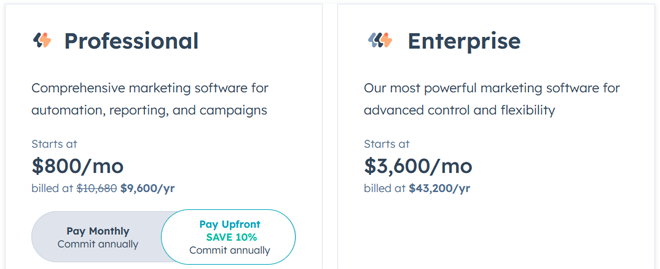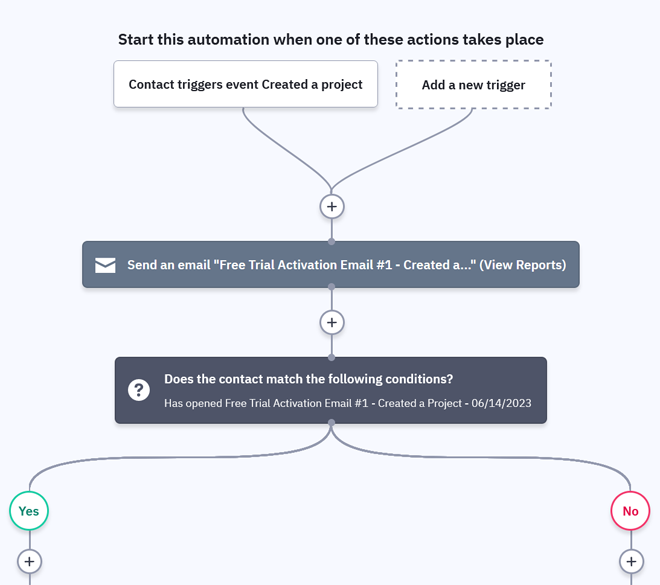Top performing SaaS companies all use marketing automation software.
For more than 10 years I've extensively used marketing automation both for Cobloom, and the companies we work with.
In this post I dive into the reasons SaaS companies need marketing automation software, and review the best tools available.
By the end of this post, you'll be better equipped to make informed decisions around what to consider trying or buying.
Last updated in January 2025.
An Introduction to Marketing Automation Software
What is Marketing Automation?
Marketing automation is the process of using online software to automate marketing activities. It helps SaaS companies to market more effectively via digital channels online, and reduce time spent on manual repetitive tasks, increasing your marketing's efficiency.
Key SaaS Marketing Automation Features
Workflow builder - a visual tool for building automated workflows, and implementing custom event-triggered automation/customer journey automation. They tend to look something like this: Lead nurturing - using a visual workflow builder to map out automated marketing paths for your sales leads, like the example above.
Custom event-triggered automation - automating a series of actions based on custom events (defined by you) that have taken place anywhere within your marketing website or users' SaaS account.
Example of a 'custom event' triggered email: an email automatically sent to one of your users, explaining the benefits of a free trial feature, triggered by them using a separate feature within their free trial.
Other Marketing Automation Use Cases
- Using chatbots to help prospects browsing your website, and qualify them for your sales team.
- Onboarding users who sign-up for your free trial, helping them to "activate" (start getting value), with custom event-triggered email sequences.
- Surveying people who signed up for a free trial and didn't go on to purchase your software.
- Using AI-powered tools to help your team develop email subject lines, or determine the best time for a contact to receive a marketing email.
- Collecting leads with an online form, then automatically segmenting those leads based on how they fill the form and their activity on your website.
- Sending targeted push notifications or SMS messages to a user's mobile phone, to re-engage them when they become inactive.
- Automating common Sales & Marketing processes, such as handling marketing-to-sales hand-offs, and assigning sales reps to leads.
The list is never-ending, but these are some of the things the most successful SaaS companies use their marketing automation software for.
The right marketing automation software for you will vary based on your requirements, and in the post below I aim to weigh-up the pros and cons for various types of SaaS companies and their levels of maturity.
Quick fact: did you know that global marketing automation software spend reached $5.2 billion in 2022? Total spend is expected to reach at least $9.5 billion by 2027, a growth rate of 12.8% per year. Source: Markets and Markets
Marketing Automation Software for SaaS Companies
1) HubSpot
HubSpot is used by more than 177,000 customers. Its all-in-one platform is split into 5 integrated components, which HubSpot refer to as:
- Marketing Hub - create landing pages, forms, marketing emails, blog posts, lead nurturing campaigns, custom event-triggered automation campaigns, ppc campaigns, etc.
- Sales Hub - HubSpot's free CRM, and sales tools your sales team can use to engage leads and customers.
- Service Hub - helpdesk software, livechat and chatbot software.
- CMS Hub - where your marketing website, its design, templates, and content live.
- Operations Hub - for integrating HubSpot and any other software you might use together, keeping data clean and synchronised.
- Commerce Hub - a suite of tools and integrations that includes everything you need to manage payments in HubSpot.
All the components of HubSpot contain features which help you and your team to automate as much as possible. They can be purchased separately, or in combined bundles.
Pros
- The most established marketing automation platform available, in terms of market presence and familiarity for hiring.
- Contains a lot of functionality not offered by most marketing automation platforms. This is especially true for its CMS and broad set of lead generation features. It's unmatched as an "all-in-one" platform.
- A good number of the tools within its platform are available for free, such as its landing page builder, contacts tool, ads, CRM, CMS & LiveChat.
- You can take advantage of HubSpot's wide ecosystem of partners and integrators. HubSpot has a huge network of service providers which can help SaaS companies effectively implement HubSpot and deliver marketing campaigns.
- Excellent in-depth training and education resources available, both via their website (for free) and from partners.
- Integrated sales tools great for SaaS companies selling software with a high touch sales process.
- Does an excellent job of combining customisability for "power users" and ease-of-use for those who value simplicity.
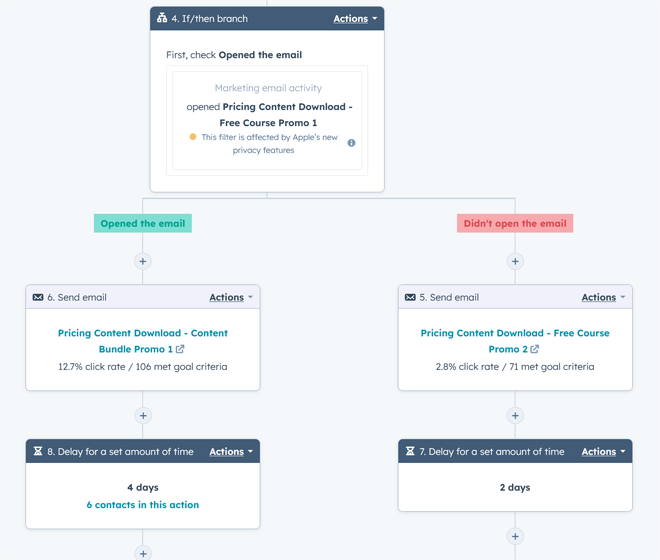
Cons
- Full breadth of HubSpot's offering can be overwhelming, there are a lot of tools you can use and while that's great for an all-in-one offering, it also presents a lot to learn!
- It takes time to fully implement paid versions of HubSpot's software, depending on how much of the platform you choose to use.
- Higher cost than some competitors due to its breadth and depth of functionality. Its workflow builder requires HubSpot Professional. Custom event triggered automation requires HubSpot Enterprise (although note our tip at the end of the Encharge review for a clever way around this).
Pricing
Conclusion
HubSpot is the most fully featured marketing automation platform for SaaS companies, hence occupying our #1 recommendation spot. It works particularly well for SaaS companies selling into mid-sized businesses or the enterprise, where you have a multi-stage sales process and purchases tend to revolve around sales team interactions rather than an entirely self-serve model.
Having used HubSpot Professional for Cobloom since 2013 (and HubSpot Enterprise on behalf of clients), we can attest to the exceptional software and support we have received throughout. HubSpot has mastered the balance of providing power and customisability to those who require it while remaining easy-to-use for everyone.
For SaaS companies which have a customer lifecycle focused around a freemium product or lower-touch sales process, other platforms may be a better fit.
2) ActiveCampaign
ActiveCampaign is a marketing automation platform that serves more than 185,000 active customers worldwide. Its relevant offering for SaaS companies spans 2 core components:
- Marketing - create landing pages, forms, marketing emails, lead nurturing campaigns, custom event-triggered automation campaigns, etc.
- Sales - ActiveCampaign's CRM, and sales tools that can be used to manage leads and close customers.
Pros
- Lower cost than most marketing automation platforms.
- You can purchase a bundle of ActiveCampaign's Sales & Marketing tools, which include a CRM. This dramatically reduces potential integration headaches.
- Custom events are included in lower tier packages, which is great for start-ups with lower-touch sales processes. It means you can do custom event-triggered marketing emails for cheaper than you can with HubSpot, without any other integrations.
- Has SMS capabilities, useful if your business is targeting consumers, rather than businesses. Most other tools require integrations for this.
- AI-powered email sending feature allows you to optimise the times your emails are sent to contacts above-and-beyond most other platforms.
- Excellent customer support availability, reps go out of their way to ensure customer success.
Cons
- Its marketing automation platform was initially created with B2C businesses in mind. More established B2B SaaS companies with a higher touch sales process often find HubSpot a better fit, as ActiveCampaign's CRM isn't as comprehensive.
- It's not as much of an "all-in-one" offering as HubSpot, more of a "half-in-one". It doesn't currently offer a blog, CMS, help desk, chatbot, live chat and SEO tools as a few examples.
You'll need to use some other tools in addition to ActiveCampaign if that functionality is important to you and not already covered. - Some users find some of the tooling is a bit clunky/glitchy, such as the email marketing tools, for example.
- Reporting tools aren't as mature as other solutions, and could be improved.
Pricing
Note: the "Enhanced CRM" is an extra which starts at $68/mo, for fuller CRM functionality
Conclusion
ActiveCampaign will usually be a great fit for SaaS companies with a low or no touch sales process, due to its origins as a B2C platform and the accompanying functionality that brings.
It's also a reasonable option for SaaS companies that have a "mid-touch" sales process (most users sign-up for a free trial and have conversations with sales) due to its well-integrated CRM, should you opt for the Enhanced add-on.
3) Ortto
Ortto is a marketing automation platform that serves more than 11,000 active customers, and has a more specialist featureset than ActiveCampaign.
Features include marketing automation, email marketing, lead nurturing campaigns, custom event triggered automation campaigns, push notification/sms marketing, live chat, in-app messaging, pop-ups, and forms & surveys.
While Ortto doesn't include a CRM, it does include a Customer Data Platform you can use to store all your customer data in one place.
Pros
- Lower cost than many marketing automation platforms.
- Well-designed, modern user interface.
- Ortto AI offers advanced marketing automation capabilities which aren't available in many other tools yet, such as subject line suggestions, and open rate predictions for emails. It can even auto-generate live chat responses for your customer service/sales reps based on content from your website, knowledgebase and past support tickets.
- Has push notification and SMS capabilities built-in.
- Helpful template library for getting started, which includes some SaaS Startup examples.
- After being integrated with your other tools, can be used to create useful dashboards. For example, if you integrate it with Stripe, you could create a recurring revenue dashboard.
- Discounted start-up package is available to SaaS companies in their first year of business who have raised less than $3M USD, have less than 10 employees and a maximum of 20k contacts.
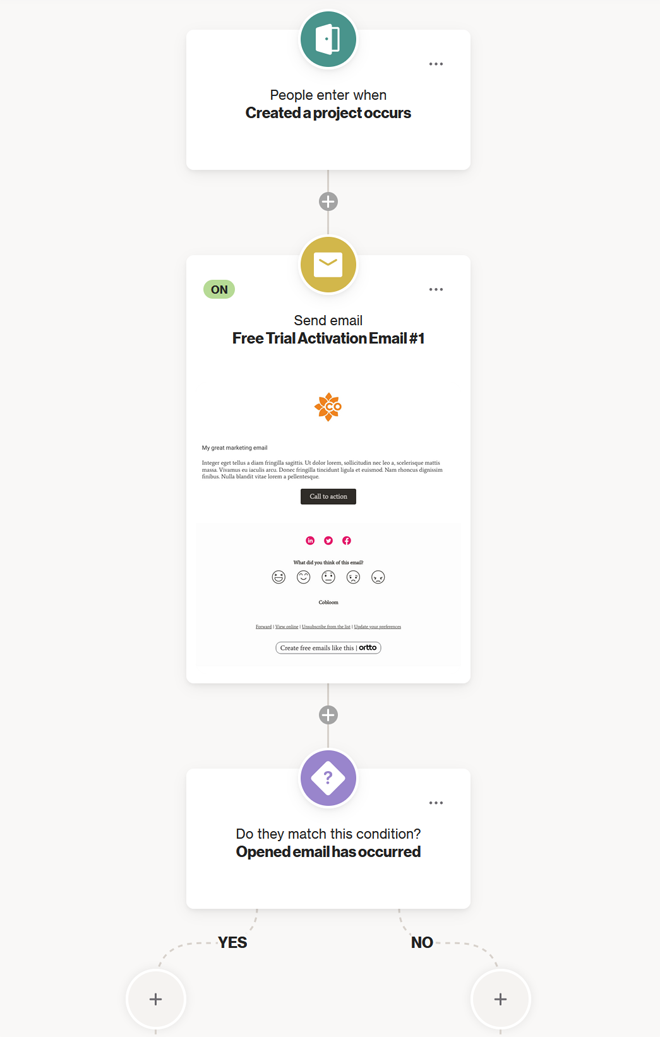
Cons
- Although Ortto offers a lower cost alternative to all-in-one marketing automation platforms like HubSpot, it's important to note that you will need to use additional tools like a CRM, CMS, landing page builder, blog, etc to fill the gaps.
- Some people have had negative experiences with their customer service. The software is designed to be mostly self-serve.
- Some users report negative experiences with their Salesforce integration, for those of you using Salesforce CRM and not looking to migrate.
Pricing

Conclusion
Ortto is a great solution for SaaS companies which want a specialised marketing automation tool without all the additional bells-and-whistles. We've found the software relatively easy to use, quickly creating emails and even custom event-triggered automation flows.
Its AI functionality for subject line ideas, customer service responses and other content will also offer value to those keen on improving productivity. It's currently quite unique among leading marketing automation software providers in this regard, although HubSpot does have a tool in beta which you can ask to be enrolled into.
4) Adobe Marketo Engage
Marketo is a marketing automation platform used by ~30,000 websites. It's typically used by scale-up SaaS companies, as opposed to start-ups.
The software is marketing focused, and does not include a CRM. Functionality spans email marketing, lead nurturing campaigns, custom event triggered automation campaigns, landing pages, forms, A/B testing, account-based marketing, reporting and SEO. They also provide a chatbot which can be used to engage visitors while they're using your website, and content recommendation engine.
Pros
- Can be used to implement advanced marketing automation campaigns.
- A versatile platform which can be customised extensively, and used to implement multi-channel marketing campaigns.
- Highly granular data analytics & reporting.
- Content recommendation engine might be useful for SaaS companies which have large volumes of published content.
Cons
- Many users find the design and tooling overall quite dated.
- There's a steeper learning curve and significant complexity to get to grips with for those on your team using the software, in comparison with other platforms we recommend above.
- Product offering is much narrower than HubSpot, and more expensive than ActiveCampaign/Ortto.
- Requires integration with an external CRM and CMS system, there's no option to buy/use a Marketo CRM or CMS.
- Many users find that integrating Marketo with other software requires a lot of unanticipated manual work.
- No offering that's suitable for start-ups, there aren't free tools or a package that really serves early stage companies.
Pricing
Marketo unfortunately does not publish its pricing, you need to speak to their sales team for a quote. Their packages start at around $900 per month.
Conclusion
The cases where Marketo might make sense are usually scale-ups that require deeper (more traditional) enterprise functionality, and companies that prioritise tools like Marketo's content recommendation engine.
Individual specialist tools like content recommendation engines can often be found cheaper elsewhere however, and then integrated with the platforms we've recommended above, if they're a core requirement (only SaaS companies with vast amounts of content would find a content recommendation engine valuable).
5) Pardot (Salesforce Marketing Cloud Account Engagement)
Pardot was acquired by Salesforce in 2007 to help them build out their portfolio of products, and offer their customers marketing automation software.
It's one of the more popular marketing automation platforms because it's owned by Salesforce, who promote it to their existing base of CRM customers.It contains Email Studio, which is used by SaaS companies to do email marketing, lead nurturing, sms/push notifications, and more advanced AI-powered campaigns.
Pros
- Can be used to implement marketing automation campaigns of varying complexities.
- Owned by Salesforce, a well trusted brand within the SaaS space. If you're within a large organisation and trying to get software approved, a brand like Salesforce is likely to be trusted.
- Contains enterprise functionality which can be useful for larger scale-ups.
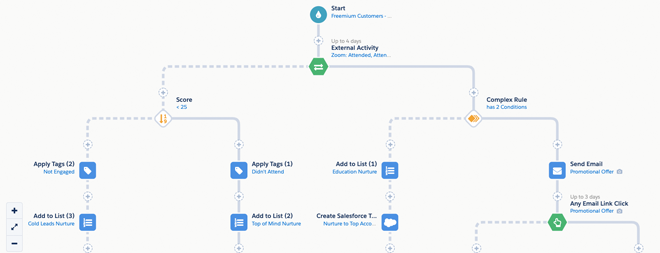
Cons
- High cost compared with other platforms.
- It has a dated, non-intuitive user interface.
- Many users seem to struggle with basic functions within the software, like e.g. searching for contacts, or creating emails which visually appear the way they want them to.
- Requires a lot of work to integrate with other software.
- Needs technical skills like SQL knowledge in order to use some of the more basic tools like segmentation, which by contrast is easy to do in most modern automation software.
- Have to host landing pages etc on a separate subdomain to your main marketing website, due to how the technology works. This negatively impacts your SEO.
Pricing
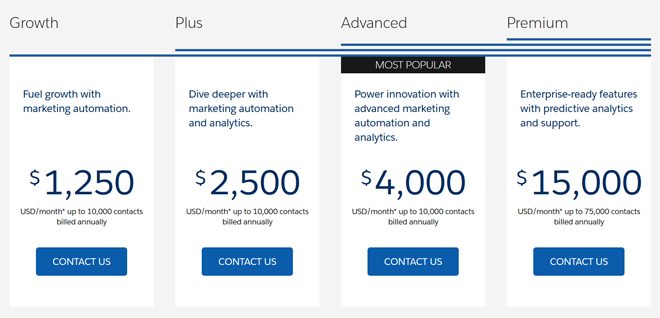
Conclusion
Pardot is more difficult to use than other platforms, requiring more training and specialist expertise. Salesforce have grown their product offering primarily by acquiring other companies, and that means their software has become unnecessarily complex.Regardless of those downsides, Pardot is still used by SaaS companies. At the price point we're unsure why an informed Scale-up would today choose it over alternatives like HubSpot, however, even if they wished to continue using the Salesforce CRM. This is due to the present strength of HubSpot's enterprise functionality and quality of their Salesforce CRM integration.
6) Encharge
Encharge doesn't offer a comprehensive marketing automation platform like the previously reviewed companies. They take a different approach to automation altogether.
Encharge focuses specifically on helping SaaS companies to convert more leads and free users into paying customers with action-driven lead nurturing emails and custom event-triggered automation.
The tool can be integrated with platforms like HubSpot, or used without any other marketing automation platform being in place.
Pros
- Lower cost than many marketing automation platforms.
- Focused on SaaS. Working with Encharge you'll receive SaaS-specialised support, something which most marketing automation platforms only offer via their partner networks.
- All packages include custom event-triggered automation.
- Good solution for start-ups and scale-ups which have a "low touch" sales process targeting small-medium sized businesses, oriented around a free plan or free trial.
- Can be integrated with lots of other tools to send in-app messages, perform tasks in your CRM, add users to PPC audiences, etc.
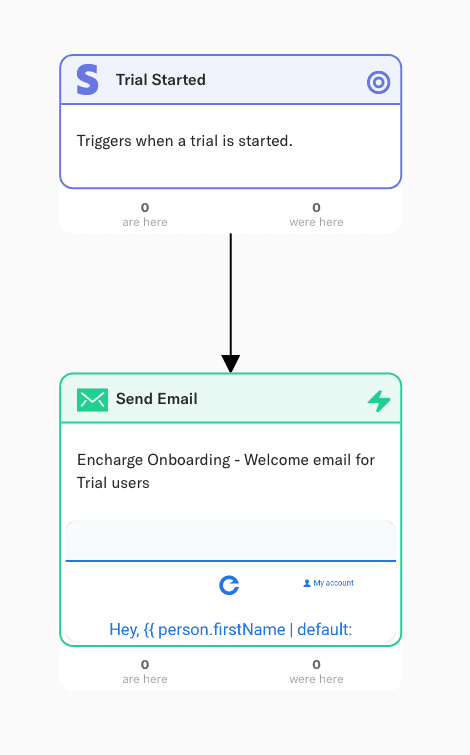
Cons
- Your data can end up silo'd across multiple tools, creating problems when it comes to reporting and keeping data accurate everywhere. Encharge will need to be integrated with either a CRM like HubSpot's, or a Customer Data Platform like Segment to mitigate this.
- While it's cheaper as an individual tool, you'll need other tools to fill the gaps which a marketing automation platform could fill, like CRM, a CMS, landing page builder, blog, etc. By the time you've bolted together all the tools you need, you may find you're paying more than you would for a platform.
- Managing multiple integrations will require some level of tech expertise. As a SaaS company you likely have people on the team who can support this, but it's important to be mindful of distracting development teams from their core task of building/improving upon your SaaS solution.
Scale-ups which take the "use many narrow tools" approach to marketing automation often hire their own dedicated development resources and have a RevOps team to manage everything at scale. - Not an optimal solution for SaaS companies which have a high-touch sales process targeting mid-size & larger businesses. These types of businesses will typically find an "all-in-one" platform like HubSpot a much better fit.
Pricing
Conclusion
Ultimately, whether to choose an all-in-one solution or a narrow automation tool like Encharge is not just a matter of which tool to use, but also a question of your SaaS company's software philosophy and operational preferences.
If you value simplicity, an all-in-one platform will be best for you. The platform will scale easily with your SaaS, and allow you not to worry about integrating as much disparate software. A platform is nearly always the right solution for a scale-up with a high touch sales process.
By contrast, if you just want a lead nurturing/custom event-triggered email automation tool, and have a lower touch (or even fully automated) sales process, then using Encharge for lead nurturing/user onboarding could be a good move for you.
Pro tip: using Encharge in combination with HubSpot Professional is a clever way to send event-triggered emails without having to upgrade to HubSpot Enterprise, and costs much less.
Conclusion
There's a large number of marketing automation software providers out there that a SaaS company could use, ranging from all-in-one platforms like HubSpot, to much narrower very SaaS focused tools like Encharge.
If after reading our guide you're still not sure what software you'd like to take the next step of trying (or demo'ing), take our free quiz below. It asks you a few basic questions about your business, and provides a couple of recommendations to try out at the end.



